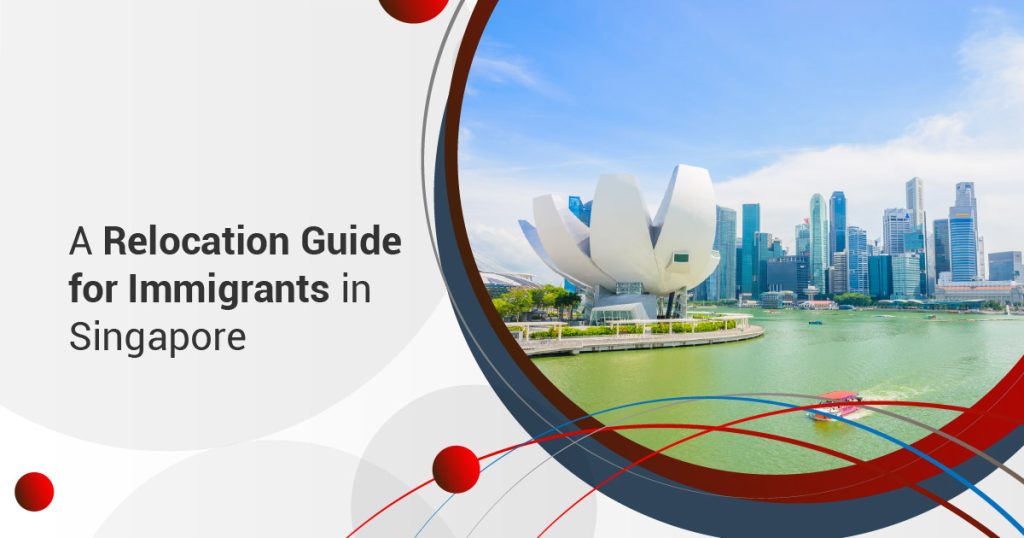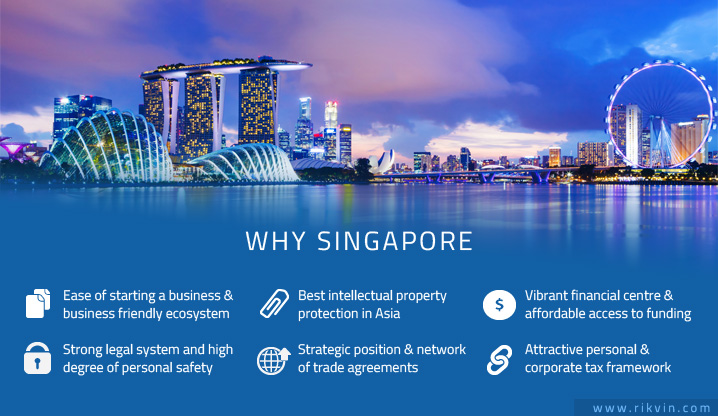 Companies all over the world, especially from the Western hemisphere, are looking towards Singapore as a jumping board to the Asian markets. As a result, we see more and more subsidiaries and holding companies being incorporated in the city-state. With none other than World Bank saying that Singapore is the best place to do business in the world (according to Ease of Doing Business rankings), the average company incorporation growth rate here has touched 8% in the last three years.
Companies all over the world, especially from the Western hemisphere, are looking towards Singapore as a jumping board to the Asian markets. As a result, we see more and more subsidiaries and holding companies being incorporated in the city-state. With none other than World Bank saying that Singapore is the best place to do business in the world (according to Ease of Doing Business rankings), the average company incorporation growth rate here has touched 8% in the last three years.
Relocating to Singapore
But once in Singapore, companies need to explore alternative options to fulfil their manpower needs because while the city-state does offer tremendous benefits for businesses (e.g. low headline corporate tax rate of 17% being a major attraction, among others), its small geographical size and tight labor market may prove to be a challenge. This reality has opened the doors to foreign professionals with suitable qualifications to relocate to the city-state with their families and experience the best place in Asia to live, work and play. Below, we present a relocation guide for immigrants in Singapore, discussing what all foreign professionals and the Singapore-registered companies hiring them need to know before, during and after the relocation process.1. Remuneration Offered in Singapore
 Companies in Singapore offer competitive and world-class remuneration benefits in a bid to attract and retain global talent. What you are offered depends on your particular experience and skills-set. there are three types of packages prevailing in the market right now:
Companies in Singapore offer competitive and world-class remuneration benefits in a bid to attract and retain global talent. What you are offered depends on your particular experience and skills-set. there are three types of packages prevailing in the market right now:
Local Package
The relocating employee is provided benefits similar to his or her Singaporean counterparts and relocation support is just enough for the employees and their families to come to the country.Local Plus Package
The benefits offered are based on relocating employee’s host country and some additional on-going assignment benefits are clubbed as well.Traditional Home based Package
Apart from full relocation and on-going assignment benefits, the relocating employee remains on the home compensation structure, and his or her tax liabilities are equal to the respective home country.2. Finding a Job in Singapore
 As opportunities arise, many popular web portals have emerged in the city-state offering career choices at all levels. These job sites allow you to browse through different industries and positions. Some examples are as follows:
As opportunities arise, many popular web portals have emerged in the city-state offering career choices at all levels. These job sites allow you to browse through different industries and positions. Some examples are as follows:
- HeadHunt
- JobsCentral
- JobsDB
- Jobstreet
- Careers@Gov
- eFinancialCareers
- Monster
- Recruit.net
- Work Singapore
3. Work Visas in Singapore
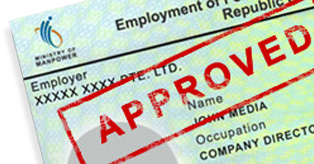 All foreigners need to get their work visas approved by the Singapore’s Ministry of Manpower (MOM) before they can start legally working for a Singapore-based business entity in the country. The available work visa options are of five types:
All foreigners need to get their work visas approved by the Singapore’s Ministry of Manpower (MOM) before they can start legally working for a Singapore-based business entity in the country. The available work visa options are of five types:
- Work Permit
- S Pass
- Employment Pass (EP – the most preferred work visa among experienced professionals, managerial personnel, and executives)
- EntrePass
- Personalised Employment Pass (PEP)
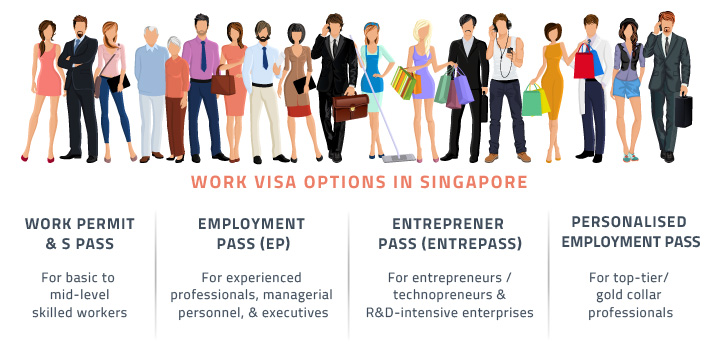
Work Permit
This is for basic-skilled workers above 18 years of age from an approved source country/territory. Hiring companies need to pay a foreign worker levy (FWL) for all their work permit holders, which is a price mechanism introduced by the government to regulate the foreign manpower numbers in Singapore. In addition, there is the Dependency Ratio Ceiling (DRC), which refers to the maximum permitted ratio of foreign workers to the total workforce that a company is allowed to hire.S Pass
The S Pass is for mid-level skilled foreigners, and is also subject to FWL and DRC like the Work Permit. While the monthly levy per S Pass holder ranges anything between S$550 and S$650, MOM states that “the number of S Pass holders a company can employ is capped at a sub-Dependency Ceiling (sub-DC), of 10% of the company’s total workforce in the Services sector and 15% in the remaining sectors”. While the minimum monthly salary for S Pass is S$3,150 and S$3,650 in the financial services sector (effective 1 Sept 2023) for young applicants; older, more experienced applicants need higher salaries for their applications to be considered for approval.Employment Pass
 The eligibility conditions for a Singapore EP, which is not subject to FWL and DRC, are:
The eligibility conditions for a Singapore EP, which is not subject to FWL and DRC, are:
- Managerial or executive roles, or specialised jobs
- A fixed monthly salary of at least S$5,600 for young graduates and higher for older experienced applicants
- A fixed monthly salary of at least S$6,200 for young graduates and higher for older experienced applicants in the financial sector
- Acceptable qualifications
- Advertise the vacancy on MyCareersFuture to demonstrate the intent of hiring locals first. However,there are certain exceptions to the MyCareersFuture requirement.
- Always pay appropriate salaries commensurate with the foreign applicant’s qualifications and experience.
- Do use MOM’s Self-Assessment Tool to gauge the EP application’s success chances.
- Always hire a foreigner whose skill-set compliments the work-force and not replace it.
- If possible, preferably hire a foreigner from tier one countries/region.
- Dependant Pass – for legally married spouse, and unmarried children (including the adopted ones) under 21 years; spouses can work in Singapore after securing a Letter of Consent from the MOM
- Long Term Visit Pass in Singapore – for common-law spouse, unmarried handicapped children above 21 years, step-children under 21, parents (only if the EP holders earns more than S$12,000 per month)
EntrePass
This work visa is for foreign entrepreneurs who wish to incorporate and run a private limited company in Singapore. Requirements for the application are quite stringent and are as follows: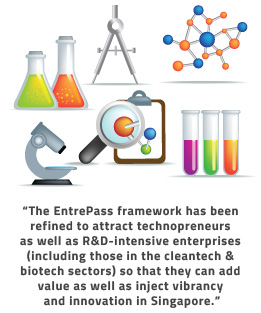
- Monetary funding of at least S$100,000 from a recognised third-party VC or a Singapore government agency accredited business angel
- Any shareholder in the company possess an IP registered with an approved national IP institution
- Ongoing research collaboration with institutes of higher learning in Singapore
- Based at a Singapore Government supported incubator
- Applicant must hold significant business experience/network and promising entrepreneurial track record
- Applicant must have exceptional technical/domain expertise in an area related to proposed business
- Applicant must hold a good track record of investing in businesses and want to grow new or existing businesses in Singapore
- A 10-page draft business plan must be submitted along with the EntrePass application, which includes: (this is important as EntrePass renewal will depend on the stated objectives achieved)
- Profile of applicant
- Business idea
- Implementation plan
Singapore Company Incorporation with Employment Pass
 As noted above, EntrePass is an option for individuals wishing to incorporate a private limited company in Singapore. But the most popular way for a foreign individual to start a business in Singapore is via the EP route. The procedure is simple.
As noted above, EntrePass is an option for individuals wishing to incorporate a private limited company in Singapore. But the most popular way for a foreign individual to start a business in Singapore is via the EP route. The procedure is simple.
- Incorporate the company using InCorp services, where we take care of the resident director (nominee director on a temporary-basis), company secretary and local physical address requirements.
- Once the company is incorporated, it can apply for your Employment Pass (EP) so that you can relocate to Singapore and take care of the new company’s businesses here.
- Once your EP is approved, InCorp’s nominee director resigns from directorship. Now, you can act as the some director.
Personalised Employment Pass
A special category of Singapore work visas is called the Personalised Employment Pass, which is for top-tier professionals whose last drawn fixed monthly salary overseas (within the last six months) must be at least S$22,500 (from 1st Sept 2023). Existing EP holders who earn at least S$22,500 (from 1st Sept 2023) every month in Singapore are also eligible for the PEP, which is issued for six months, and the holder has the freedom to pursue any desired employment opportunity in Singapore. Importantly, PEP holders do not need to reapply for a new pass when changing jobs and can submit the PEP notification form to MOM. If the PEP is approved after 1 September 2023, you must earn a fixed salary of at least $270,000 per calendar year.4. Personal Taxation in Singapore
Every working individual in Singapore, whether resident or non-resident, is required to file a separate tax return every calender year on all his or her incomes including gains or profits from a trade or profession and earnings from employment. Notably, there is no Pay As You Earn system in Singapore and the tax return filing must be done in respect of income from the preceding year by April 15 of the following year. The eligibility for being treated as a tax resident in Singapore is:- a citizen or a permanent resident residing in Singapore except for temporary absences; or
- a foreigner who has stayed/worked in Singapore (excludes director of a company) for 183 days or more in the year before the year-of-assessment
| From YA 2024 onwards | |||
|---|---|---|---|
| Chargeable Income | Income Tax Rate (%) | Gross Tax Payable ($) | |
| First $20,000 Next $10,000 |
0 2 |
0 200 |
|
| First $30,000 Next $10,000 |
– 3.50 |
200 350 |
|
| First $40,000 Next $40,000 |
– 7 |
550 2,800 |
|
| First $80,000 Next $40,000 |
– 11.5 |
3,350 4,600 |
|
| First $120,000 Next $40,000 |
– 15 |
7,950 6,000 |
|
| First $160,000 Next $40,000 |
– 18 |
13,950 7,200 |
|
| First $200,000 Next $40,000 |
– 19 |
21,150 7,600 |
|
| First $240,000 Next $40,000 |
– 19.5 |
28,750 7,800 |
|
| First $280,000 Next $40,000 |
– 20 |
36,550 8,000 |
|
| First $320,000 Next $180,000 |
– 22 |
44,550 39,600 |
|
| First $500,000 Next $500,000 |
– 23 |
84,150 115,000 |
|
| First $1,000,000 In excess of $1,000,000 |
– 24 |
199,150 | |
Do note that foreign-source income of a Singapore tax-resident is exempt from income tax in Singapore, except for the income received through a partnership in Singapore.
For non-resident individuals, the rates are as follows:- up to 60 days – the employment income is tax exempt if the individual is in Singapore on short-term employment for 60 days or less in a year; do note that the exemption does not apply to a director of a company, a public entertainer or exercising a profession in Singapore
- 61 – 182 days – the individual is taxed on all income earned in Singapore (no personal relief apply) at 15% or the resident rate, whichever gives rise to a higher tax amount
- director fees, consultant fees and all other incomes are taxed at 20 percent
Tax Clearance for Foreign Employees – Singapore Companies Take Note
In Singapore, it is a company’s responsibility to ensure that its every non-citizen foreign employee settles all his or her due taxes on cessation of employment or if he/she plans to leave Singapore for more than three months. The company must notify the Inland Revenue Authority of Singapore at least one month prior to the non-citizen employee leaving the employment and seek tax clearance from the Authority.5. Other Considerations when Relocating to Singapore
Once you have found a job in Singapore and got your work visa approved, it’s time to focus on other but equally important considerations such as housing, healthcare, education, transportation and banking facilities in the country. Few such considerations are detailed below.Climate
 Singapore is known for its year-round tropical climate, which is sunny with intermittent showers. The temperature averages between 28 and 31 degrees Celsius during the day and 23 and 27 degrees Celsius at night.
In general, Singapore has two main seasons, the Northeast Monsoon (December to March) and the Southwest Monsoon season (May to September), separated by two relatively shorter inter-monsoon periods.
Singapore is known for its year-round tropical climate, which is sunny with intermittent showers. The temperature averages between 28 and 31 degrees Celsius during the day and 23 and 27 degrees Celsius at night.
In general, Singapore has two main seasons, the Northeast Monsoon (December to March) and the Southwest Monsoon season (May to September), separated by two relatively shorter inter-monsoon periods.
Housing in Singapore
Housing types vary widely in Singapore. While you can choose sprawling bungalows or cosy terraces depending on your budget, a vast majority of locals and expatriates live in high-rise apartments. These may either be private condominiums or government-subsidised Housing Development Board flats. There are no restrictions on non-citizens renting a residential unit (except for HDB flats which have a minimum occupation period). Engaging an accredited local property agent who can protect your interests and help in finding a house is always a good idea. If you are in Singapore for short-term, serviced apartments are a convenient alternative. Few examples are Ascott The Residence, Citadines Apart’hotel, Frasers Hospitality, and Great World Serviced Apartments. Singapore also has a unique type of housing – the black and white bungalows, which are double-storied with servants’ quarters. These are a legacy of the country’s colonial past and are now owned by the government.
Generally, popular residential areas in Singapore are districts 9, 10 and 11, which are close to the Central Business District. Do note that if you go for a property close to amenities and Singapore’s highly efficient Mass Rapid Transit (MRT) stations, you may be paying higher rents.
Once you like a property you may want to live in, the following steps are involved before you take possession of the property:
Singapore also has a unique type of housing – the black and white bungalows, which are double-storied with servants’ quarters. These are a legacy of the country’s colonial past and are now owned by the government.
Generally, popular residential areas in Singapore are districts 9, 10 and 11, which are close to the Central Business District. Do note that if you go for a property close to amenities and Singapore’s highly efficient Mass Rapid Transit (MRT) stations, you may be paying higher rents.
Once you like a property you may want to live in, the following steps are involved before you take possession of the property:
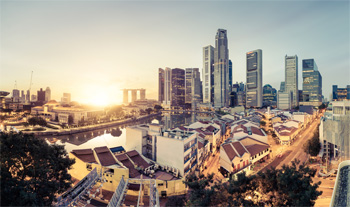
- Get your agent to prepare a letter of intent listing down the details and conditions, including rental amount and requirements. Once the landlord decides that he wants to let his property to you, he will prepare a tenancy agreement.
- Sign the agreement with the landlord, which specifies all the terms and conditions of the tenancy agreement. As of now, private residential apartments are intended only for long-term stays as prevailing laws do not allow these residential units to be rented on a daily, weekly or monthly basis. Thus, usually, the lease commitment has to be for a minimum period of six months.
- Sign an inventory listing of all the items provided by the landlord.
- Usually, a deposit equivalent to one/two month’s rent is required for leases that are over a year.
- Be sure to put a diplomatic clause in the agreement, which allows you to terminate the lease early should you no longer be employed in Singapore. This is applicable only in tenancy agreements for a fixed term of 24 months.
Healthcare in Singapore
In Singapore, primary healthcare services are provided by general practitioners (GPs) in 18 polyclinics and over 1,400 private medical clinics spread across the island. Their services include outpatient medical treatment, follow-ups after discharge from hospital, immunisation, screenings, and diagnostic and pharmaceutical services. If needed, patients are referred to either of the eight public hospitals, where they can receive more specialised treatment and be warded if necessary. Out of these eight, six are general hospitals, a women’s and children’s hospital, and a psychiatry hospital. General hospitals provide multi-disciplinary inpatient and specialist outpatient services, and 24-hour emergency departments.
In addition, Singapore also has six national specialty centers providing cancer, cardiac, eye, skin, neuroscience and dental care.
Moreover, Singapore has also focused on Traditional Chinese Medicine (TCM) and other traditional or alternative medical treatments in recent years.
As regards to medical insurance, citizens and permanent residents enjoy the benefits of Singapore’s 3Ms policy, which corresponds to Medisave, Medifund and MediShield Life. Immigrants may consider buying private health insurance or their company’s group health insurance. It’s always advisable to shop around a bit to find an insurer and policy that suits one’s needs.
More details can be found at Singapore’s Ministry of Health’s website.
Out of these eight, six are general hospitals, a women’s and children’s hospital, and a psychiatry hospital. General hospitals provide multi-disciplinary inpatient and specialist outpatient services, and 24-hour emergency departments.
In addition, Singapore also has six national specialty centers providing cancer, cardiac, eye, skin, neuroscience and dental care.
Moreover, Singapore has also focused on Traditional Chinese Medicine (TCM) and other traditional or alternative medical treatments in recent years.
As regards to medical insurance, citizens and permanent residents enjoy the benefits of Singapore’s 3Ms policy, which corresponds to Medisave, Medifund and MediShield Life. Immigrants may consider buying private health insurance or their company’s group health insurance. It’s always advisable to shop around a bit to find an insurer and policy that suits one’s needs.
More details can be found at Singapore’s Ministry of Health’s website.
Education in Singapore
As a country whose natural resource is only its people, Singapore has a world-class and widely appreciated education system. The local public school year consists of four 10-week terms beginning on January 2nd every year. There is a one-week vacation after the first and third terms, a four-week vacation at mid-year, and a six-week vacation at year-end. As these public schools are increasingly becoming popular with immigrants, the Ministry of Education conducts an annual admissions exercise during September/October for new international students who wish to join the public schools.
Such foreign students must apply for a Student’s Pass unless they hold a Dependant’s Pass or an Immigration Exemption Order.
Additionally, the city-state has a wide variety of educational pathways for students with special talents, such as the Singapore Sports School, School of the Arts and the Yong Siew Toh Conservatory of Music.
Another option for immigrants is to send their children to private or foreign-system schools, which may offer a curriculum similar to the kid’s home country. Recently, Singapore’s top local schools ACS International, Hwa Chong International and SJI International, established their own international schools offering secondary and post-secondary education.
As these public schools are increasingly becoming popular with immigrants, the Ministry of Education conducts an annual admissions exercise during September/October for new international students who wish to join the public schools.
Such foreign students must apply for a Student’s Pass unless they hold a Dependant’s Pass or an Immigration Exemption Order.
Additionally, the city-state has a wide variety of educational pathways for students with special talents, such as the Singapore Sports School, School of the Arts and the Yong Siew Toh Conservatory of Music.
Another option for immigrants is to send their children to private or foreign-system schools, which may offer a curriculum similar to the kid’s home country. Recently, Singapore’s top local schools ACS International, Hwa Chong International and SJI International, established their own international schools offering secondary and post-secondary education.
 Among the institutes of higher learning, Singapore currently has four autonomous universities – the National University of Singapore, Nanyang Technological University, Singapore Management University, and Singapore University of Technology and Design. Some internationally known institutions such as INSEAD, LASALLE College of the Arts and Nanyang Academy of Fine Arts have also made Singapore their home in recent years.
Finally, there are over 300 private education institutions in Singapore offering a variety of language, technical and professional programmes.
Among the institutes of higher learning, Singapore currently has four autonomous universities – the National University of Singapore, Nanyang Technological University, Singapore Management University, and Singapore University of Technology and Design. Some internationally known institutions such as INSEAD, LASALLE College of the Arts and Nanyang Academy of Fine Arts have also made Singapore their home in recent years.
Finally, there are over 300 private education institutions in Singapore offering a variety of language, technical and professional programmes.
Transportation
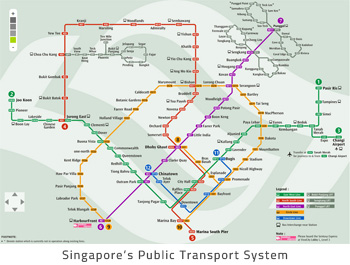 Singapore is known for its world class transport infrastructure encompassing an efficient rail and bus system, a carefully designed road and traffic structure, and controlled car ownership.
Cars are driven on the left side of the road with a right-hand drive. Some mandatory traffic rules include fastening of seat belts, avoiding bus lanes during certain hours, and not using mobile phones while driving. Non-Singaporeans who intend to be in Singapore for more than 12 months must convert their foreign driving licences into a Singapore driving licence.
The country also has readily available and relatively cheap taxi services. But the easiest and quickest ways to get around Singapore is the Singapore Mass Rapid Transit (MRT). Comprising four lines and 89 stations, the comprehensive network spans across most of Singapore. The trains are safe, clean and reliable, arriving every three to eight minutes from 5.30am to 12.30am daily.
Singapore is known for its world class transport infrastructure encompassing an efficient rail and bus system, a carefully designed road and traffic structure, and controlled car ownership.
Cars are driven on the left side of the road with a right-hand drive. Some mandatory traffic rules include fastening of seat belts, avoiding bus lanes during certain hours, and not using mobile phones while driving. Non-Singaporeans who intend to be in Singapore for more than 12 months must convert their foreign driving licences into a Singapore driving licence.
The country also has readily available and relatively cheap taxi services. But the easiest and quickest ways to get around Singapore is the Singapore Mass Rapid Transit (MRT). Comprising four lines and 89 stations, the comprehensive network spans across most of Singapore. The trains are safe, clean and reliable, arriving every three to eight minutes from 5.30am to 12.30am daily.
Banking
Singapore is home to 125 commercial banks, of which five are local and the rest are all foreign banks. The five locally-incorporated entities are owned by the banking groups – Development Bank of Singapore (DBS), United Overseas Bank (UOB), and Oversea-Chinese Banking Corporation (OCBC), which have consistently ranked among the strongest in the world. Once you have decided on the bank, opening a bank account in Singapore is simple. While some requirements may differ, generally banks in Singapore will need your work visa, passport, employer’s letter and proof of the mailing address to open an account. Notably, most international credit cards are accepted in Singapore, especially at hotels, retailers, restaurants, supermarkets, travel agencies, and even in taxis.
Once you have decided on the bank, opening a bank account in Singapore is simple. While some requirements may differ, generally banks in Singapore will need your work visa, passport, employer’s letter and proof of the mailing address to open an account. Notably, most international credit cards are accepted in Singapore, especially at hotels, retailers, restaurants, supermarkets, travel agencies, and even in taxis.
Culture and Language
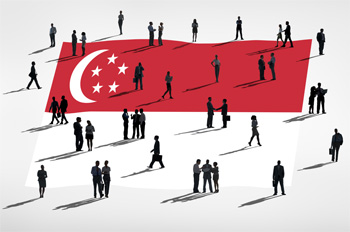 Singapore is known for its blend of the best of East and West. This applies to the country’s cultural scene as well. Thus, if you sometimes miss your home country’s culture, do look at Singapore’s main ticketing agent, SISTIC’s website. You may find your favourite singer from back home performing in Singapore!
As such Singapore’s own calendar is filled with several cultural events/festivals/celebrations throughout the year, which is a testimony to the country’s multicultural and multiracial population. Some examples are Pongal celebrated in January, Thaipusam and Chinese New Year in February, Vesak Day in June, Hari Raya Puasa in July, Mid-autumn festival in September, Deepavali in November and Christmas in December.
Moreover, Singapore has four officially declared national languages – Malay, Mandarin, Tamil, and English. English is the medium of education and business, making the country one of the most easily adaptable in Asia. Most Singaporeans are bilingual, as in addition to learning English, every student studies his or her mother tongue as well.
Singapore is known for its blend of the best of East and West. This applies to the country’s cultural scene as well. Thus, if you sometimes miss your home country’s culture, do look at Singapore’s main ticketing agent, SISTIC’s website. You may find your favourite singer from back home performing in Singapore!
As such Singapore’s own calendar is filled with several cultural events/festivals/celebrations throughout the year, which is a testimony to the country’s multicultural and multiracial population. Some examples are Pongal celebrated in January, Thaipusam and Chinese New Year in February, Vesak Day in June, Hari Raya Puasa in July, Mid-autumn festival in September, Deepavali in November and Christmas in December.
Moreover, Singapore has four officially declared national languages – Malay, Mandarin, Tamil, and English. English is the medium of education and business, making the country one of the most easily adaptable in Asia. Most Singaporeans are bilingual, as in addition to learning English, every student studies his or her mother tongue as well.
Embassies
It’s always a good idea after arriving in a foreign land to be informed and keep in touch with your home country’s embassy. Singapore maintains diplomatic relations with 175 countries and there are 67 resident foreign embassies and high commissions, 41 foreign consular posts and 10 international organisations in Singapore. All details about these are easily accessible at Singapore’s Ministry of Foreign Affairs website.People also ask
Can I live in Singapore without a job?
- In general, no, you cannot live in Singapore without a job. The only option for living in Singapore without a job would be as the dependant of a current Singapore working visa holder. You can apply for a Dependant’s Pass if your spouse has one of the following Singapore working visas:
- S Pass
- Personalised Employment Pass (PEP)
- Employment Pass (EP)
- EntrePass
Is living in Singapore worth it?
- Yes, it is absolutely worth living in Singapore! Singapore is world renowned for being a hub of diversity, cleanliness, safety, and fun. The jobs pay well, and there is a thriving expat community of nearly 1.4 million people enjoying their lives to the fullest in Singapore. There are many options for living and working in Singapore as a foreigner.
How much money do you need to live in Singapore?
- Knowing how much money you need to live in Singapore is completely dependent on your lifestyle, whether you have a family, and where you want to live. While it’s true Singapore can be an expensive place to live, the jobs in Singapore pay very well, and the quality of living is very high. It should also be noted that the individual tax rate caps at just 24%, and there are no capital gains or inheritance taxes.
What is a good salary in Singapore 2025?
- The average salary in Singapore is $70,000 annually or about $5,783 per month. To give you an idea of what different types of workers earn in Singapore, the minimum salaries required for each of the main Singapore working visas are:
- The Singapore Work Permit for Foreign Workers is for semi-skilled or unskilled employees. There is no minimum salary required for the Singapore Work Permit.
- The Singapore S Pass is a visa for mid-skilled workers such as technicians. There is a minimum salary of $3,150 per month for the Singapore S Pass visa.
- The Singapore Employment Pass is for foreign professionals. There is a minimum salary of $5,000 per month for the Singapore Employment Pass visa.
- The Singapore Entrepreneur Pass is for foreign business owners who wish to move their business over to Singapore. There is no minimum salary for the Singapore Entrepreneur Pass visa, but you will need to have capital of at least $50,000.
- The Singapore Personalised Employment Pass (PEP) is for foreign, top-level executives. There is a minimum salary of $22,500 per month for the Singapore Personalised Employment Pass visa.

